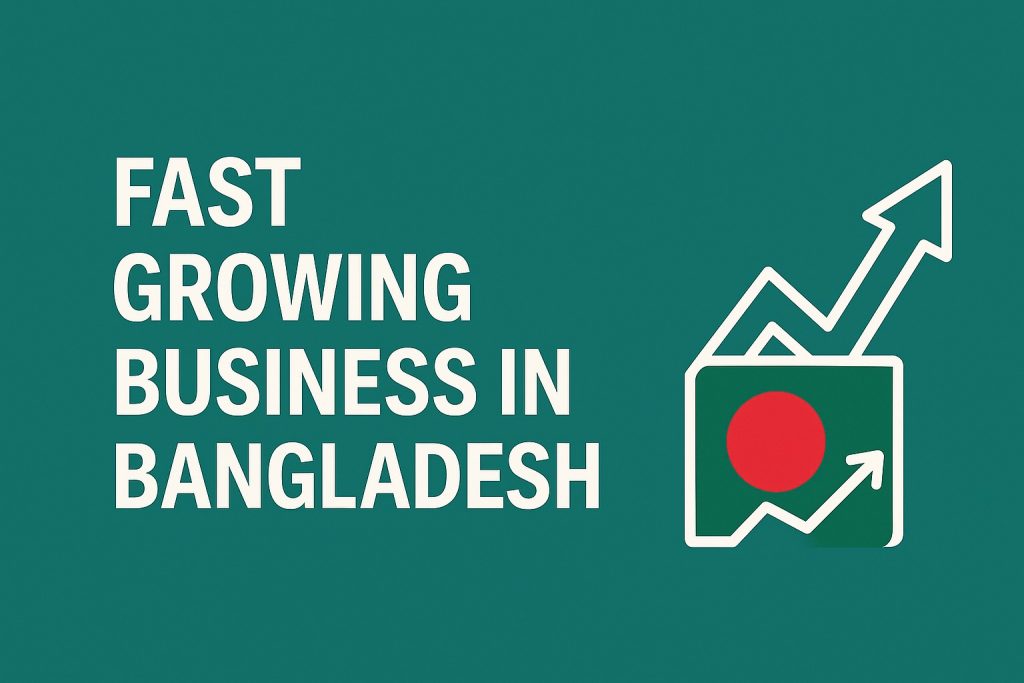Bangladesh has rapidly emerged as a dynamic center for business growth in South Asia. Over the past decade, the country has evolved beyond its traditional image, becoming known for its vibrant industries, enterprising workforce, and remarkable economic momentum of Bangladesh.
Underpinned by supportive government policies, increasing foreign investment, and a generation of ambitious young professionals, Bangladesh has become fertile ground for innovation and entrepreneurship.

In this article, we explore the fast growing business in Bangladesh, highlighting the sectors at the forefront of progress and the key drivers behind this impressive transformation.
We will look at the key sectors driving this economic surge, from technology and e-commerce to the ever-important textiles and pharmaceuticals.
You will also learn about the specific government policies and foreign investments that are creating a fertile ground for business success.
Key Drivers of Business Growth in Bangladesh
Several powerful forces are driving Bangladesh’s business expansion. A fast-growing middle class is fueling demand across retail, technology, and services, while rapid digital adoption through smartphones, e-commerce, and mobile payments is transforming how businesses reach consumers. Government initiatives like SME-credit schemes, export diversification, and infrastructure development are further accelerating entrepreneurial growth. With a young, tech-savvy population and better access to finance, small ventures are thriving across both urban and rural markets.
These combined drivers are shaping new opportunities for entrepreneurs, many of which are highlighted in the most profitable small business ideas in Bangladesh a reflection of how innovation and resilience continue to redefine the nation’s growth story.
Favorable Government Policies and Incentives
The Bangladeshi government has actively implemented policies to attract investment and stimulate growth. Initiatives like the “Digital Bangladesh” vision have laid the groundwork for a robust tech ecosystem introduced by the Sheik Hasina Resim Government..
The government offers attractive incentives for both local and foreign investors, including tax holidays, duty-free import of machinery, and the establishment of Special Economic Zones (SEZs). These zones provide high-quality infrastructure, streamlined administrative processes, and logistical support, making it easier for businesses to set up and operate.
A Young and Ambitious Workforce
One of Bangladesh’s greatest assets is its population. With over 50% of its people under the age of 25, the country boasts a large, energetic, and increasingly skilled workforce. This demographic dividend provides a steady supply of talent for emerging industries.
Educational institutions are also adapting, offering more specialized training in areas like IT, engineering, and business management to meet the demands of the modern economy.
Influx of Foreign Direct Investment (FDI)
International confidence in Bangladesh’s potential is growing. Foreign Direct Investment has been on an upward trend, flowing into sectors like energy, telecommunications, and manufacturing. Countries like China, Japan, the United States, and the United Kingdom are major investors. This influx of capital not only funds new projects but also brings advanced technology, management expertise, and access to global markets, further accelerating growth.
Top Industries Fueling the Economic Boom
While growth is widespread, a few sectors stand out for their exceptional performance and future potential. These industries are not just expanding; they are redefining Bangladesh’s position on the global stage.
1. Technology and IT Services
The tech sector is arguably the most exciting frontier in Bangladesh’s economy. The government’s goal is to turn the IT industry into a billion-dollar export market, and it’s well on its way.
Software Development and IT Outsourcing
Bangladeshi companies are providing high-quality software development, web design, and IT support services to clients worldwide. The country has become a competitive destination for Business Process Outsourcing (BPO) and IT-enabled services (ITES) due to its cost-effective and skilled labor force. Companies like Tiger IT are known for producing high-tech solutions, including biometric identification systems used in national projects.
FinTech and Mobile Financial Services (MFS)
The financial technology (FinTech) space has exploded, revolutionizing how Bangladeshis manage money. MFS providers like bKash and Nagad have brought financial services to millions of unbanked and underbanked citizens. These platforms allow users to send money, pay bills, and make purchases using their mobile phones, driving financial inclusion and powering the digital economy. bKash, a subsidiary of BRAC Bank, serves over 70 million customers, demonstrating the incredible scale of this transformation.
2. E-commerce and F-commerce
With increasing internet penetration and a growing middle class, online shopping has surged in popularity. The e-commerce market is one of the fastest-growing in the country.
The Rise of Online Marketplaces
Platforms like Daraz (owned by Alibaba) have become household names, offering everything from electronics to groceries. These marketplaces have created a vast ecosystem that includes sellers, logistics partners, and digital payment providers. The COVID-19 pandemic further accelerated this trend, as more consumers turned to online channels for their daily needs.
F-commerce: The Social Media Marketplace
A unique trend in Bangladesh is “F-commerce,” or Facebook commerce. Thousands of small entrepreneurs, many of them women, run businesses directly through Facebook pages and groups. They sell clothing, crafts, food, and other goods, leveraging the platform’s vast reach to connect with customers. This grassroots entrepreneurial movement has empowered individuals to start businesses with minimal investment.
3. Readymade Garments (RMG) and Textiles
The RMG sector has long been the backbone of Bangladesh’s economy, and it continues to grow and evolve. As the world’s second-largest apparel exporter, the industry is a massive source of employment, particularly for women.
Moving Towards High-Value Products
While traditionally focused on basic garments, the industry is now shifting towards more complex, high-value items like suits, lingerie, and technical apparel. Manufacturers are investing in modern technology and sustainable practices to meet the changing demands of global brands. Many factories are now LEED-certified, positioning Bangladesh as a leader in green manufacturing.
Success Story: DBL Group
DBL Group is a prime example of a diversified textile conglomerate that started with apparel and has since expanded into ceramics, pharmaceuticals, and dredging. Their focus on sustainability, innovation, and employee welfare showcases the modern face of the Bangladeshi textile industry.
4. Pharmaceuticals
The pharmaceutical industry is a major success story. Bangladesh meets approximately 98% of its domestic demand for medicine and exports its products to over 150 countries.
A Hub for Generic Drug Manufacturing
The sector’s strength lies in producing high-quality generic drugs at competitive prices. Know more about of the Top Pharmaceuticals Companies like Square Pharmaceuticals, Incepta Pharmaceuticals, and Beximco Pharma are leading players, investing heavily in research and development to expand their product portfolios. The government’s support and the skills of local chemists and pharmacists have been crucial to this success. The industry is poised for further growth as more patents on blockbuster drugs expire globally.
5. Agriculture and Agri-tech
Agriculture remains a vital part of the economy, but it is undergoing a technological revolution. Modernization is key to ensuring food security and increasing export earnings.
Innovation in Farming
Agri-tech startups are introducing new solutions to old problems. They are developing platforms for precision agriculture, providing farmers with data on soil health and weather patterns. Companies are also building more efficient supply chains, connecting farmers directly to markets and reducing post-harvest losses. This innovation is making farming more profitable and sustainable.
Food Processing and Exports
The food processing industry is another fast-growing area. Bangladeshi companies are processing local fruits, vegetables, and fish for both domestic consumption and export. Products like frozen foods, juices, and packaged spices are finding markets in Europe, the Middle East, and North America, where there is a large Bangladeshi diaspora.
The Future Looks Bright
Bangladesh is on a clear path of economic progress, driven by a powerful mix of strategic planning, entrepreneurial energy, and a globally competitive workforce. The fast-growing businesses in technology, e-commerce, textiles, and pharmaceuticals are not just creating jobs and wealth; they are building a more resilient and diversified economy.
For investors, entrepreneurs, and global partners, offers a compelling for business opportunity in Bangladesh. The nation’s journey from a developing country to an emerging economic powerhouse is a testament to the spirit of its people. As it continues to embrace innovation and open its doors to the world, the list of fast-growing businesses in Bangladesh is only set to get longer.

